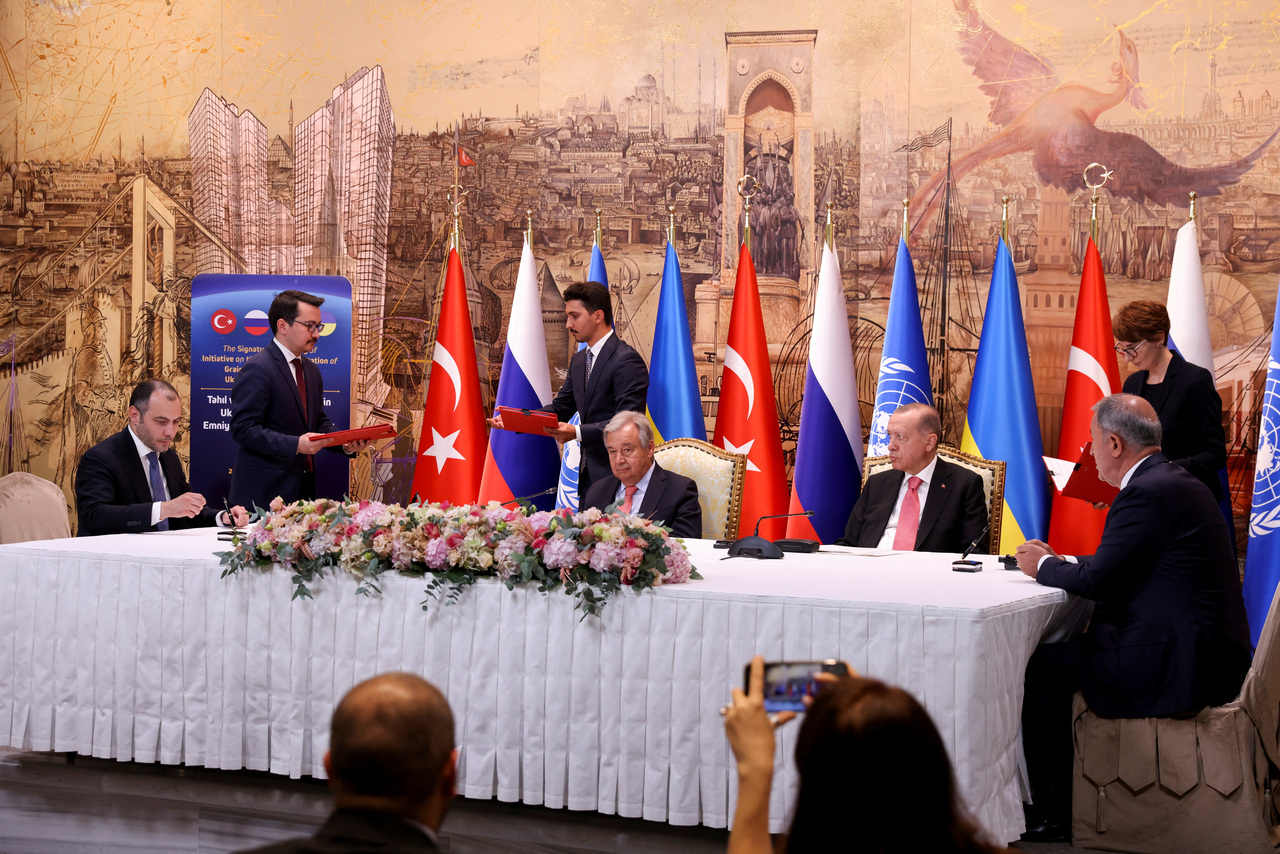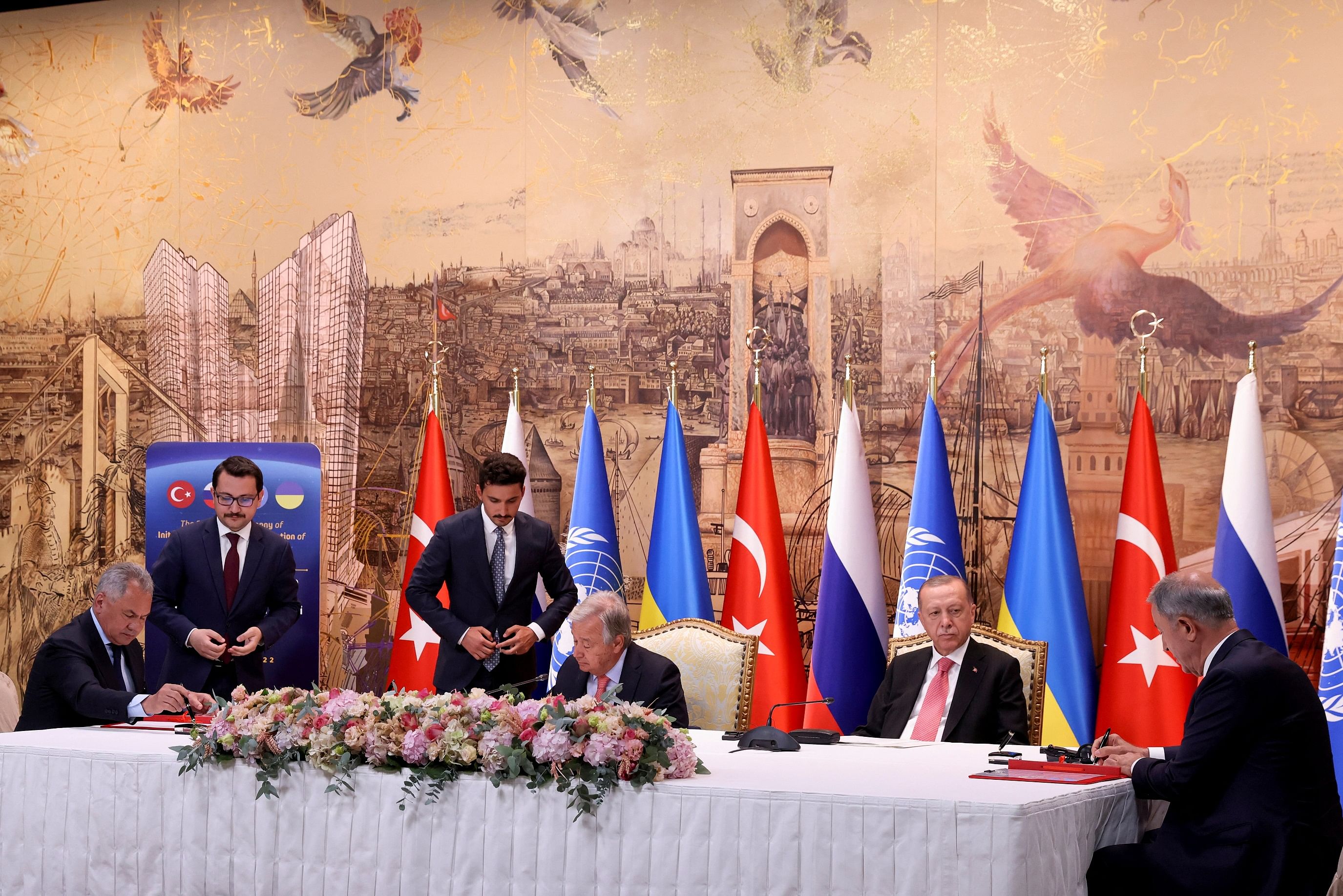Ukraine, Russia ink deal to reopen grain export ports
Sign up now: Get ST's newsletters delivered to your inbox

Ukrainian Infrastructure Minister Oleksandr Kubrakov, UN Secretary-General Antonio Guterres, Turkish President Recep Tayyip Erdogan and Turkish Defence Minister Hulusi Akar attend the signing ceremony.
PHOTO: REUTERS
ISTANBUL (REUTERS, AFP) - Russia and Ukraine signed a landmark deal on Friday (July 22) to reopen Ukrainian Black Sea ports for grain exports, raising hopes that an international food crisis aggravated by the Russian invasion can be eased.
The two countries are among the world’s top food exporters and Moscow’s Feb 24 invasion has blockaded Ukrainian ports, stranding dozens of ships, leaving 20 million tonnes of grain stuck in silos and driving up world grain prices.
The accord crowned two months of talks brokered by the United Nations and Turkey aimed at what UN Secretary General Antonio Guterres called a “package” that would both restore Ukrainian grain exports while easing Russian grain and fertiliser shipments despite tough Western sanctions on Moscow.
Mr Guterres said the accord opens the way to significant volumes of commercial food exports from three key Ukrainian ports – Odesa, Chernomorsk and Yuzhny, and the UN would set up a coordination centre to monitor implementation of the deal.
But fighting raged on unabated in Ukraine’s east and, underlining deep-seated enmity and mistrust driving the worst conflict in Europe since World War II, Russian and Ukrainian representatives declined to sit at the same table at the ceremony, and the display of the two countries’ flags was adjusted so that they were no longer next to one other.
“In case of provocations, (there will be) an immediate military response” by Ukraine, Mykhailo Podolyak tweeted.
Russia and Ukraine sent their defence and infrastructure ministers, respectively, to Istanbul for the signing ceremony, also attended by Mr Guterres and Turkish President Tayyip Erdogan.
A blockade of Ukrainian ports by Russia’s Black Sea fleet has worsened global supply chain bottlenecks and, along with sweeping Western sanctions, stoked galloping inflation in food and energy prices around the world.
Moscow has denied responsibility for the worsening food crisis, blaming instead Western sanctions for slowing its own food and fertiliser exports and Ukraine for mining the approaches to its Black Sea ports.
Senior UN officials, briefing reporters Friday, said the deal was expected to be fully operational in a few weeks.
Safe passage into and out of the ports would be guaranteed in what one official called a “de facto ceasefire” for the ships and facilities covered, they said, although the word “ceasefire” was not in the agreement text.
The two UN officials said they expect to see restoration of grains shipments to pre-war levels of 5 million tonnes a month.
The UN officials said the parties agreed the general outline of the initiative such as the ports involved, the establishment of a monitoring centre in Istanbul, ways of inspecting the ships involved, and the limitations of the plan.
“We are looking at a very quick rate of implementation,” one of the officials said. “We start (today) to establish the Joint Coordination Centre (JCC),” the person said, adding that minor issues remained to be worked out before the initiative could be put fully into effect.

Russian Defence Minister Sergei Shoigu, UN Secretary-General Antonio Guterres, Turkish President Recep Tayyip Erdogan and Turkish Defence Minister Hulusi Akar attend the signing ceremony.
PHOTO: REUTERS
“We are talking about a few weeks before we will see proper implementation of vessels going in and out,” the official said, although there could be an “initial movement of ships” to show that the mechanism will work.
Under the plan, Ukrainian officials will guide ships through safe channels across mined waters to three ports, including the major hub of Odesa, where they will be loaded with grain.
Ships will then exit Ukrainian territorial waters in the Black Sea, transit the Bosphorus strait to a Turkish port for inspection and later head to their destinations.
“We are aiming for a monthly export of about 5 million metric tonnes, which was the pre-war level from those three ports,” the official said.
Asked how the implementation of the plan would be monitored, the official said representatives from all parties would work in the JCC to oversee operations, vessel inspections, and possible incidents.
Both Ukraine and Russia have agreed not to attack any vessels involved in the initiative, the officials said.
Russian Defence Minister Sergei Shoigu said on Friday that conditions were in place to unlock grain exports from Ukraine in the “next few days” and promised Moscow would not take advantage of de-mined Ukrainian ports.
“Today, we have all the prerequisites and all the solutions for this process to begin in the next few days,” Shoigu said, after signing the deal.
“We are talking not only about the beginning of the export of agricultural products from Ukrainian ports, but also, of course, work on agricultural products, fertiliser from Russian ports,” he said in televised remarks.
He added that Russia formally pledged not to take advantage of de-mined Ukrainian ports.
“We have undertaken this obligation,” he said, referring to Friday’s deal. “Moreover, a very specific date is indicated there, the exact period for which this will all be done.”
Shoigu and Ukrainian Infrastructure Minister Oleksandr Kubrakov each signed separate but identical agreements with UN and Turkish officials on reopening blocked Black Sea delivery routes.


